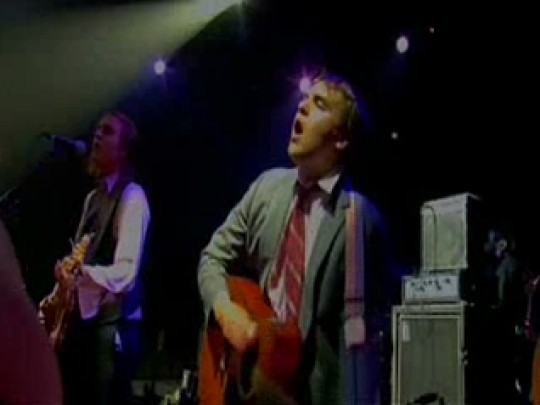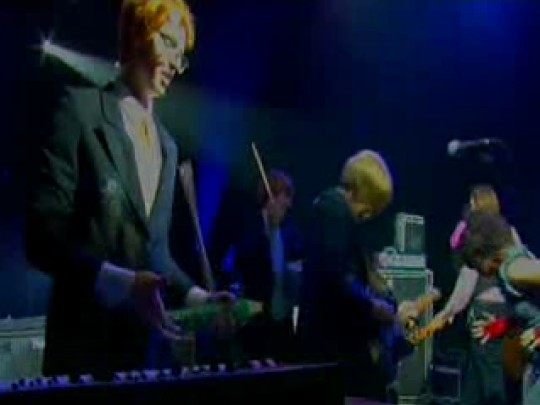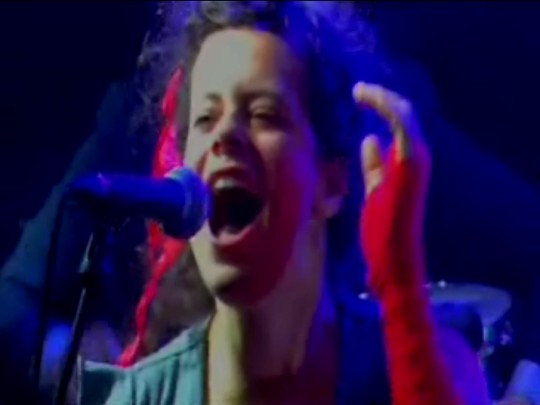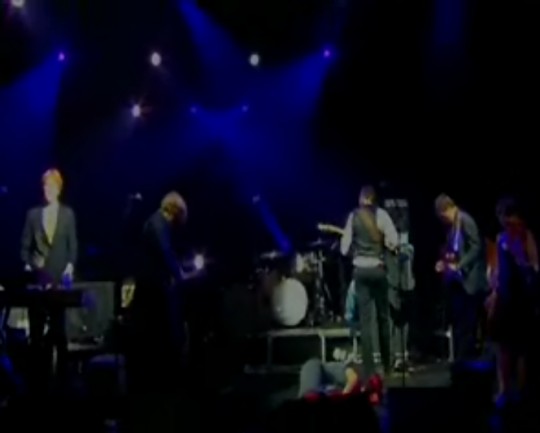|
IN THE FOREST, WE ARE HIDING
Todos somos Marcos.
Your reporter's always wanted to go to indie alterno-festival All Tomorrow's Parties. In many ways it represents everything I love the most - a brutalist 1960s British holiday resort straight out of Hi-De-Hi, playing host to a strange musical blend of playful tweeness, the wilfully avant-garde, and uncompromising Puritanism, and filled with a hedonistic crowd of young people who don't see why, just because they see the world of Ibiza Uncovered as a hell on Earth, they shouldn't be allowed to go wild in the country sometimes too.
Unfortunately, for logistical reasons (largely but not solely related to not having the required three like-minded friends to share a chalet with) it's never come to pass, and during the most recent event in 2005, your correspondent was stuck at home as usual watching the telly. Which turned out to be just as well, as otherwise he'd have missed one of the most powerful things shown on British TV all year, less than five minutes of broadcasting which somehow managed to précis both the central message of the most important book ever written in human history, and the core philosophy of the political movement which represents the last hope for progressive civilisation in the face of a future that grows more terrifying every day.
It's mostly people going "Ooh ooh-ooh-ooh ooh ooh ooh".

Audience applaud imminent bold attempt to link catchy pop tune to Zapatista rebels.
Channel 4, having nowadays given its peak-time programming over almost entirely to the sick and hideous black joke at humanity's expense that is Big Brother, still quietly sticks a few interesting things on, unhyped and unadvertised, in the hours after midnight. By sheer chance, your reporter happened to catch one of them during the ATP weekend, in the form of a broadcast of a concert in Paris by much-lauded Canadian band The Arcade Fire. Having previously had mixed and mostly lukewarm feelings towards what little I'd heard of their work, I decided to watch it anyway for want of anything better to do, and to see if I could figure out what everyone else was getting so excited about. It turned out to be a great show, full of brilliant tunes played with verve and passion, and I ended up much more convinced than I'd been before. But one track in particular stood out a mile from the others.
Even by the eclectic standards of the rest of the band's output, "Haiti" is an odd little song. With lyrics that are a random whatever-rhymes-best jumble of French and English, it's about the civil-war-torn Central American island fragment of the same name, ruled for generations by the autocratic tyrants of the
Duvalier family and which (according to the CIA World Factbook) is the poorest nation in the Western Hemisphere. But it doesn't take a lot of effort to interpret the song a lot more broadly, and the live performance captured in the show added a whole new dimension to that interpretation too. If you'll indulge your reporter, he'll try to use it now to demonstrate, second by second, just why he believes that music is, above all others, the most powerful artform and communicative force in the world.

Keyboardist looks like eerie gigantic shadowy wraith.
|
"Haiti, my country/Wounded mother I'll never see.
My family, set me free/Throw my ashes into the sea." |
[NB all lyrics here translated into English for convenience]
As the song's intro starts up, the camera flits around in the gloom, revealing the band members lurking in the shadows with flashes of light on the drumbeats. None of them are looking at each other, and the impression is of a bunch of people who've just wandered onto a stage, armed with instruments but no real idea of what they're supposed to be doing there. They all noodle away on their own for half a minute or so, before everyone quietens down as singer Regine delivers the opening lines about her homeland. At 00:52 there's the first hint that the band are actually a collective unit, when they all step forward to their microphones (in a moment reminiscent of The Clash doing the same thing in the video to "London Calling") to croon the "Ooh ooh ooh-ooh" refrain that runs right through the song.
(So out of place is this sudden burst of synchronisation that Regine
turns, as if in surprise, to her right to see what's just happened.
Seemingly irritated at the sight, she snaps back round, lips pursed,
and looks away again. It's almost the only time in the whole song
that any of the members of the band will visibly acknowledge each
other's existence, and the whole performance is a striking
idealistic metaphor for how a ragbag of unrelated individuals can
co-operate and build great and cohesive creative works without
surrendering their separate identities, or even
appearing to necessarily like each other very much.)
The lyrics have opened with a pretty bleak couplet, but there's darker to come.

"Hey, cut out the choreography. This isn't bloody Riverdance."
|
"My cousins never born/Haunt the nights of Duvalier
Nothing can stop our spirits/Guns can't kill what soldiers can't see." |
At 01:17 we're treated to the curious sight of what appears to be one of the guitarists having some sort of twitching fit, spasming to his left with every hit of the snare drum. The band often react to their own music as if they're hearing it for the first time, as if they're the audience and the sound is coming from somewhere outside them. (At 01:41, for example, we also see one of the guitarists singing along loudly, despite being nowhere near a mic, then vigorously strumming along on his acoustic guitar a few seconds later in a section where there's clearly no acoustic guitar being played. Maybe, like Sid Vicious miming for the Sex Pistols, he's mostly there as eye candy and isn't actually plugged into anything.)
By now we've arrived at the song's message, which is - if you're keeping score - where it converges with both "1984" (we'll get to the Zapatism stuff in a little while, don't worry), and for what passes as your correspondent's own philosophy on authority and power. It's a simple but profound truth, with a fundamental influence over how one chooses to live one's life, and you can express it in four words: you can't kill ideas.
Orwell's masterpiece takes the dark side of that premise to its logical conclusion, where the savagely oppressive rule of the Party is forever because its principles and laws and power are passed down from each generation to the next by belief, regardless of physical heredity - or, as the book puts it:
"The essence of oligarchical rule is not father-to-son inheritance, but the persistence of a certain world-view and a certain way of life, imposed by the dead upon the living. A ruling group is a ruling group as long as it can nominate its successors."
But of course, that premise cuts both ways. Resistance can be oligarchical too.

"Why won't they give me a mic? Everybody else has one. Even the drummer."
The next verse of the song, sung by an indeterminate number of the band's members against a musical backdrop which has suddenly increased in intensity and morphed into something that sounds like a nuclear warning alarm going off in an underground military bunker in a Cold War movie, distils
the song's entire lyrical essence into two spine-tingling couplets.
|
"In the forest, we are hiding/Unmarked graves where flowers grow
Hear the soldiers' angry yelling/In the river we will go." |
It doesn't take too fanciful a leap of imagination to attribute those lines to the fighters of any resistance movement you choose, be they in Haiti, Vietnam, 1940s France, the jungles of Mexico or wherever your own sympathies lie. But it's the underlying defiance in them that matters, that brings goosebumps to the skin of anyone who cares about human civilisation as a whole, rather than just themselves and their own. The second line proudly celebrates the determined survival of individuals, melting away out of sight of their persecutors - because there's no heroism in throwing your life away recklessly for your cause - but it's the first one that really carries the message inside it. If all these references so far are a bit intellectual for you, think of it as the bit in the first Star Wars movie where Alec Guinness as ageing Jedi Obi-Wan Kenobi faces down Darth Vader in the Death Star hangar.
"You can't win, Darth", says the weak and frail old man to the towering, menacing dark lord. "If you strike me down, I shall become more powerful than you can possibly imagine." In the movie it's partly symbolic of the pseudo-religious presence of "the Force", but it also alludes to the power of martyrdom, the fallen hero as myth and inspiration. (Because of course, living leaders almost invariably end up revealed with feet of clay. Perhaps only Castro of all the world's revolutionaries has survived decades while remaining largely unsullied in the eyes of his comrades.) But what "Haiti" notes is that it's not only crusading leader-figures who inspire beyond their death. Every unmarked grave whose occupant is remembered by someone, somewhere is a seed from which future resistance will bloom. It's the elimination of that remembrance, not the elimination of the individuals, that forms the chilling heart of "1984", and which the song proclaims its defiance of.

"Is that a dead wasp on the floor?"
After the verse, most of the instrumentation drops out, leaving only the wailing
air-raid siren of the guitar and the occasional drumbeat to carry the tune while the listener digests the significance of the words they've just heard.
(There's a great moment at 02:04 when we see
multi-instrumentalist Richard standing at his keyboard, playing a
melodion with his mouth and hitting a drum and cymbal all at once. A
few seconds later he's on the keyboard and singing, and at other
times he plays bass and guitar too. In The Arcade Fire, the division
of duties seems to be "whoever's wandered nearest to the instrument
in question at the time".)
At 02:24 the band all step up
together Clash-style again, the choppy urgency of the siren-guitar
stops and there's a brief period of calm and unity while everyone
listens to the soothing strum of the acoustic and gathers themselves for the final passage of the song.
|
"All the
stillborn form an army/Soon we will reclaim the earth.
All the tears and all the bodies/Bring about our second
birth." |
This is the point where the message
changes from one of resistance and survival to one of resurgence and
revolution. Because however many mass graves a despot might fill
with corpses,
something that's far less transient than a mere human being will
always survive and be eternally resurrected afresh, can only be
reinforced and invigorated by the memory of the crimes of the past,
and will inevitably rise up to destroy the ruler's chosen inheritors
(be they biological or ideological). It's not a question of if, only a matter of how long.
|
"Haiti,
never free/I am not afraid to sound the alarm.
Your children have gone/In those days their blood was still
warm." |
With that unmistakeable threat, the
lyrics of the song are over, and on record so is the rest of it,
with only a short instrumental coda that segues into the next track
on the album. It seems set to fade away into nothingness in the live
rendition too, with the band members milling on stage seemingly
lost for direction and purpose, adjusting their glasses or looking
around for their next instrument. (In common with the whole
performance, the band rarely seem more than vaguely aware of the
existence of the audience, focusing instead mainly on their local
responsibilities - a microcosm of Zapatism, if you've been following
the links. Main vocalist Win spends most of the song with his back
to the crowd.)
But in an exhilarating
demonstration of the principle of that which seemed irretrievably
exhausted and defeated being merely dormant and exploding back to
life in an unforeseen instant, there's a sudden pounding heartbeat of bass drum and Regine bursts into
exuberant voice, joyfully exclaiming with wordless ululations the
thrill of being alive.

And also the thrill of having a tambourine (not
pictured).
It's a fleeting moment, just as the
life of an individual is microscopically fleeting in the grand scale
of things. For 30 seconds the stage is alive with chaos and light,
as everyone flays wildly at anything to hand that'll make a noise as if
their very lives depended on it. But then the surge abates and this
time the song does fall silent, one instrument at a time dropping
out until Regine herself crumples to the floor - tambourine still
clutched in her hand - as if dead. The rest of the band, though, are
utterly unconcerned with her apparent plight, and most of them
ignore her prone form and wander off absent-mindedly, driving home yet again
the core message of the song. Once more, 1984's O'Brien offers the
dark side of the same truth as he wears Winston down in his
relentless, merciless interrogation/brainwashing:
"You are thinking
that my face is old and tired. You are thinking that I talk of
power, and yet I am not even able to prevent the decay of my own
body. Can you not understand, Winston, that the individual is only a
cell? The weariness of the cell is the vigour of the organism. Do
you die when you cut your fingernails?"
"Suppose that we
quicken the tempo of human life till men are senile at thirty. Still
what difference would it make? Can you not understand that the death
of the individual is not death? The Party is immortal."
For those who can be bothered to look
for it, "Haiti" describes and encapsulates this entire belief system
(over 300 pages of book if you were born in 1948) in under five
minutes, and it may be the single most important thing that anyone
can ever learn in their lifetime. We live in an age where
individuals seem perhaps more powerless than at any time in the last
century. Everywhere in the West the traditional polarised system of
politics has been replaced by two barely-different shades of the
same colour, while
elsewhere
tyranny has half the planet in a seemingly-tightening grip, and
resistance can all too easily seem futile.
But such recent developments are no
more inherently eternal than those which have
come and
gone in the
past. At our worst - if we allow them to become so through the
abdication of
personal
and
local responsibility - then everything humanity has ever
achieved since time began will be permanently
lost
and better successors will deservingly take our place, the
alternative interpretation/meaning of the song's penultimate verse.
But until such times, the unkillable idea will continue to be
broadcast and heard. Concepts of civilisation that were thought crushed forever by the cruel, selfish twin creeds of neoliberalism and dictatorship are merely biding their time
amid the darkness:
in the
forest, we are hiding. There's always a way to fight, and there are no
excuses for giving up as long as you draw breath.


|

